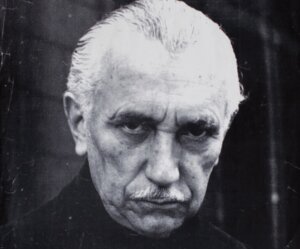Enrique Pichon-Rivière, an Argentinian Psychoanalyst

Enrique Pichon-Rivière is one of the most important Argentinian psychoanalysts. In fact, he’s considered one of the pioneers of group psychoanalysis not only in Argentina but the whole of Latin America. However, he wasn’t an orthodox follower of the discipline. His contributions were based on his own knowledge and experience.
After his extensive clinical experience, Enrique Pichon-Rivière decided to focus on social psychology. In one of his most important works, El Proceso Grupal: del Psicoanálisis a la Psicología Social (The Group Process: from Psychoanalysis to Social Psychology), he defined social psychology as the democratization of psychoanalysis. He made great contributions to the field of group psychology. His perspective united dialectics, homeostasis, and cybernetics.
“In our society, there’s an apparatus of domination aimed, ultimately, at perpetuating production relationships, in other words, exploitation relationships. This apparatus of domination has its framework in psychiatrists, psychologists, and other health workers who are transmitting a hierarchical, dilemmatic, and non-dilemmatic position of behavior.”
-Enrique Pichon-Rivière-
He was also a critic of psychiatric practice. In fact, he considered it was highly influenced by power relations rather than therapeutic objectives. Furthermore, that instead of facilitating patient recovery, it actually helped prolong mental illnesses.

Enrique Pichon-Rivière and his confusing childhood
Enrique Pichon-Rivière was born in Geneva, Switzerland. His father was English, and his mother was French. He was the only child of his father’s second marriage. However, he didn’t know about this until he was about six years old. Apparently, it had a huge impact on him.
His parents had progressive ideas. Despite being reasonably wealthy, they were socialists. In addition, they promoted justice and equality and rejected racism.
They suddenly moved from Europe to Argentina. Pichon-Rivière always claimed he never knew why.
The future psychiatrist and psychoanalyst arrived in Argentina at the age of three. The family stayed briefly in Buenos Aires before moving to the province of Santa Fé, in the area known as Chaco Santafesino. Then, they moved to the province of Corriente. In this area, there were many Guaraní people. In fact, Pichon-Rivière often mentioned that he learned to speak Guaraní before Spanish.
The making of a future psychiatrist
Pichon-Rivière’s first encounter with Freud’s work occurred during his secondary studies, at school in Goya. It had a profound impact on him since he had also been greatly impacted by the magical idea of the world of the Guaraní and, at the same time, by what he called “the great family secret” (his parentage).
He became one of the founders of the socialist party of Goya. He later decided to study medicine and moved to the city of Rosario. There, he adopted a rather bohemian lifestyle and got a job as an “instructor of manners” for Polish prostitutes.
His rather chaotic lifestyle led to him contract pneumonia. He returned to Goya and then moved to Buenos Aires where he graduated as a doctor in 1936.
In Buenos Aires, he became friends with some of the great intellectuals of the time, including the famous writer, Roberto Arlt. He was also passionate about poetry and literature. In fact, he ended up writing art and sports articles for the newspaper La Crítica.
His psychiatric practice
Pichon-Rivière also trained as an anthropologist and psychiatrist. Firstly, he worked at the Torres Asylum for oligophrenics. Then, he became a psychiatrist at the Hospice of Mercy. He worked there for 15 years. During his time there, he conceived the ideas that he later developed into his theories. The first thing that he noticed was the abuse shown by the nurses toward the patients.
He subsequently set up working groups with nurses. In these classes, he instructed them on the basics of psychiatry to get them to treat patients better. This was a big change.

However, a little later, the nurses went on strike. This lasted for several months. For this reason, Pichon-Rivière was forced to train some patients to replace them.
The results were surprising. In fact, the condition of the patients who were charged with carrying out the nursing duties improved in leaps and bounds. It seems that being busy, feeling useful, and interacting in a different way with the hospital significantly improved their health. For this reason, Pichon-Rivière started to emphasize the value of the social factor in mental illness.
After a brilliant career and several published works, Pichon-Rivière founded a private school of social psychology and published his theory regarding operative groups. He died in Buenos Aires on July 16, 1977, at the age of 70.
Enrique Pichon-Rivière is one of the most important Argentinian psychoanalysts. In fact, he’s considered one of the pioneers of group psychoanalysis not only in Argentina but the whole of Latin America. However, he wasn’t an orthodox follower of the discipline. His contributions were based on his own knowledge and experience.
After his extensive clinical experience, Enrique Pichon-Rivière decided to focus on social psychology. In one of his most important works, El Proceso Grupal: del Psicoanálisis a la Psicología Social (The Group Process: from Psychoanalysis to Social Psychology), he defined social psychology as the democratization of psychoanalysis. He made great contributions to the field of group psychology. His perspective united dialectics, homeostasis, and cybernetics.
“In our society, there’s an apparatus of domination aimed, ultimately, at perpetuating production relationships, in other words, exploitation relationships. This apparatus of domination has its framework in psychiatrists, psychologists, and other health workers who are transmitting a hierarchical, dilemmatic, and non-dilemmatic position of behavior.”
-Enrique Pichon-Rivière-
He was also a critic of psychiatric practice. In fact, he considered it was highly influenced by power relations rather than therapeutic objectives. Furthermore, that instead of facilitating patient recovery, it actually helped prolong mental illnesses.

Enrique Pichon-Rivière and his confusing childhood
Enrique Pichon-Rivière was born in Geneva, Switzerland. His father was English, and his mother was French. He was the only child of his father’s second marriage. However, he didn’t know about this until he was about six years old. Apparently, it had a huge impact on him.
His parents had progressive ideas. Despite being reasonably wealthy, they were socialists. In addition, they promoted justice and equality and rejected racism.
They suddenly moved from Europe to Argentina. Pichon-Rivière always claimed he never knew why.
The future psychiatrist and psychoanalyst arrived in Argentina at the age of three. The family stayed briefly in Buenos Aires before moving to the province of Santa Fé, in the area known as Chaco Santafesino. Then, they moved to the province of Corriente. In this area, there were many Guaraní people. In fact, Pichon-Rivière often mentioned that he learned to speak Guaraní before Spanish.
The making of a future psychiatrist
Pichon-Rivière’s first encounter with Freud’s work occurred during his secondary studies, at school in Goya. It had a profound impact on him since he had also been greatly impacted by the magical idea of the world of the Guaraní and, at the same time, by what he called “the great family secret” (his parentage).
He became one of the founders of the socialist party of Goya. He later decided to study medicine and moved to the city of Rosario. There, he adopted a rather bohemian lifestyle and got a job as an “instructor of manners” for Polish prostitutes.
His rather chaotic lifestyle led to him contract pneumonia. He returned to Goya and then moved to Buenos Aires where he graduated as a doctor in 1936.
In Buenos Aires, he became friends with some of the great intellectuals of the time, including the famous writer, Roberto Arlt. He was also passionate about poetry and literature. In fact, he ended up writing art and sports articles for the newspaper La Crítica.
His psychiatric practice
Pichon-Rivière also trained as an anthropologist and psychiatrist. Firstly, he worked at the Torres Asylum for oligophrenics. Then, he became a psychiatrist at the Hospice of Mercy. He worked there for 15 years. During his time there, he conceived the ideas that he later developed into his theories. The first thing that he noticed was the abuse shown by the nurses toward the patients.
He subsequently set up working groups with nurses. In these classes, he instructed them on the basics of psychiatry to get them to treat patients better. This was a big change.

However, a little later, the nurses went on strike. This lasted for several months. For this reason, Pichon-Rivière was forced to train some patients to replace them.
The results were surprising. In fact, the condition of the patients who were charged with carrying out the nursing duties improved in leaps and bounds. It seems that being busy, feeling useful, and interacting in a different way with the hospital significantly improved their health. For this reason, Pichon-Rivière started to emphasize the value of the social factor in mental illness.
After a brilliant career and several published works, Pichon-Rivière founded a private school of social psychology and published his theory regarding operative groups. He died in Buenos Aires on July 16, 1977, at the age of 70.
All cited sources were thoroughly reviewed by our team to ensure their quality, reliability, currency, and validity. The bibliography of this article was considered reliable and of academic or scientific accuracy.
- De Quiroga, A. P. (1997). El proceso educativo según Paulo Freire y Enrique Pichon-Rivière. Plaza y Valdés.
This text is provided for informational purposes only and does not replace consultation with a professional. If in doubt, consult your specialist.







